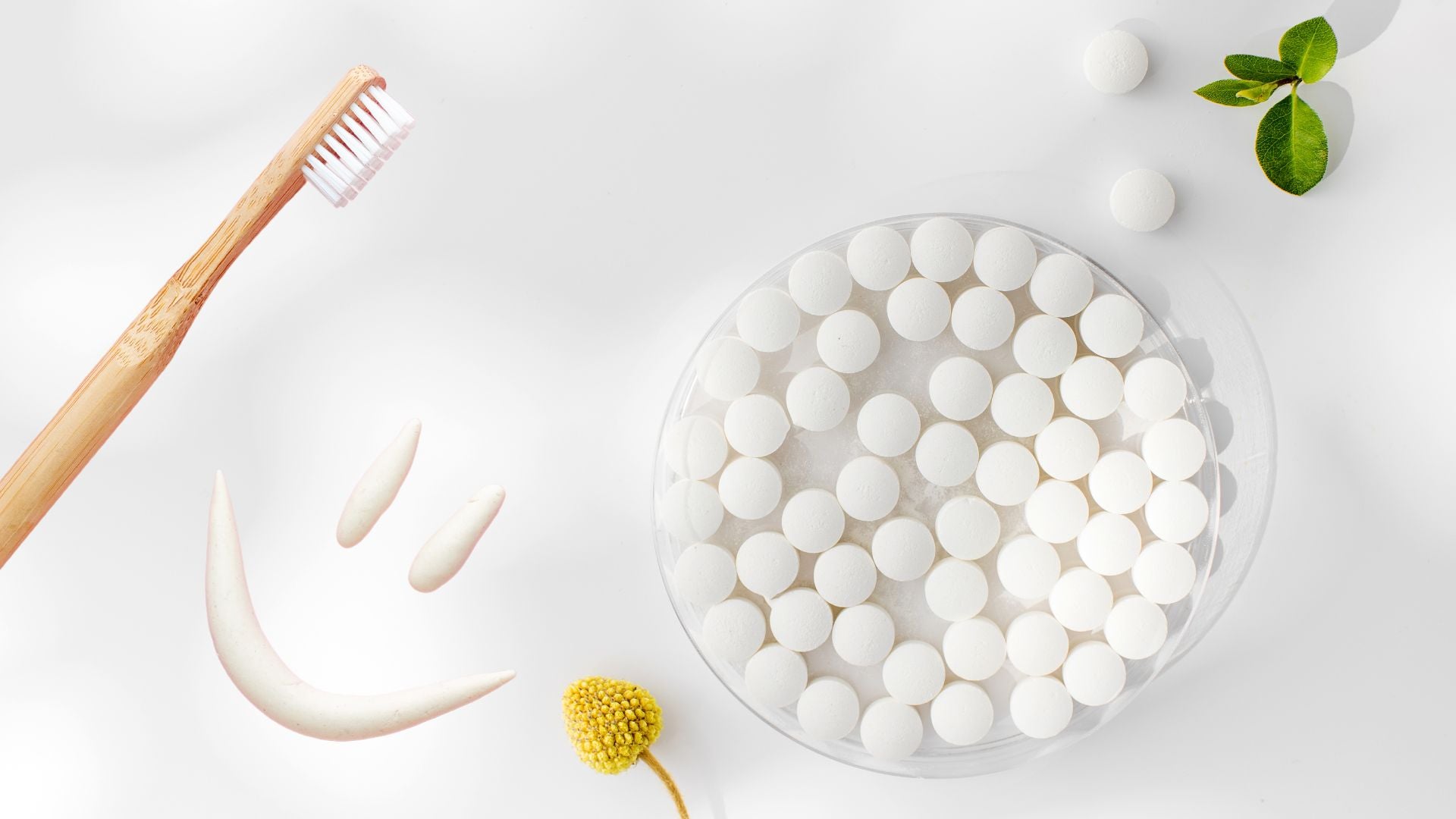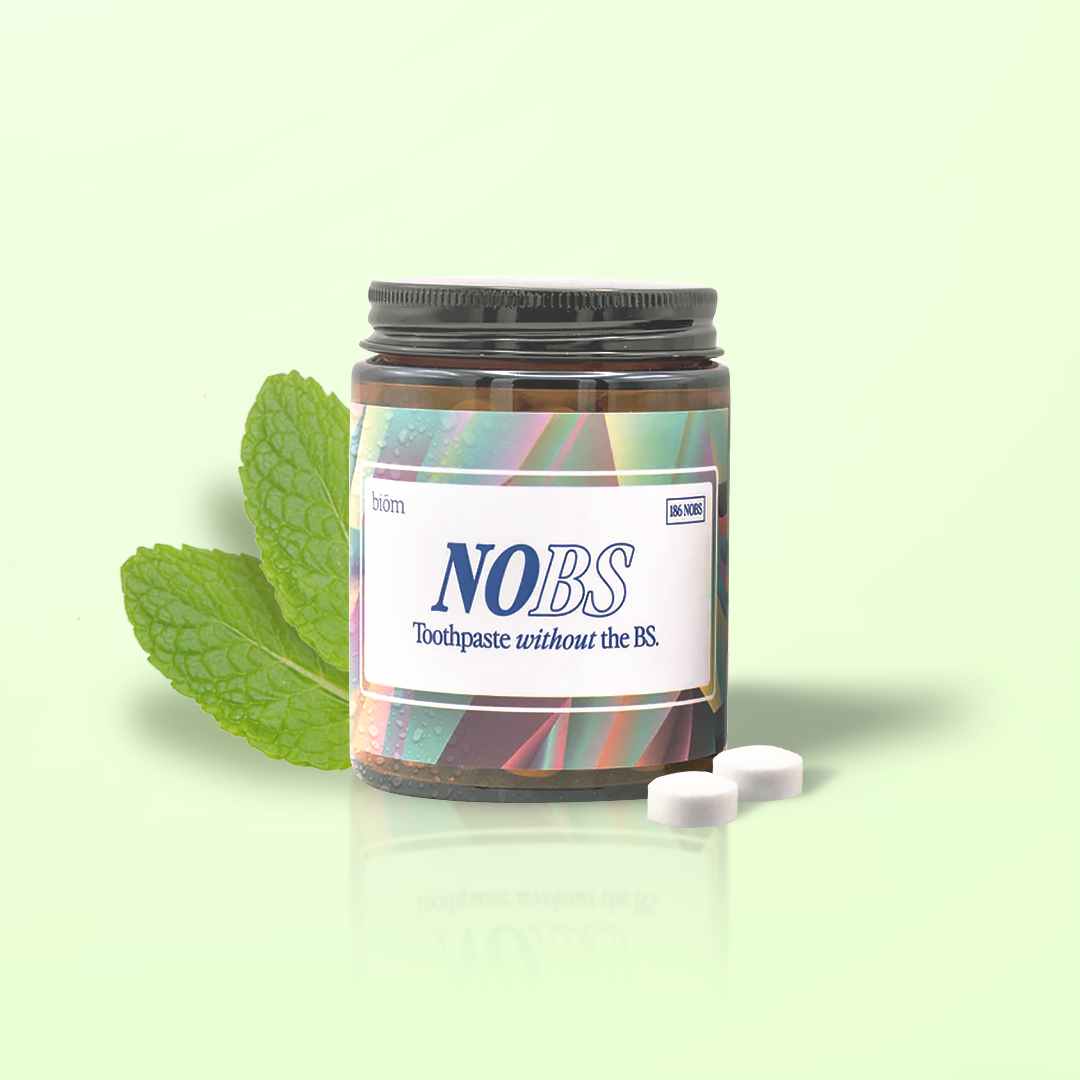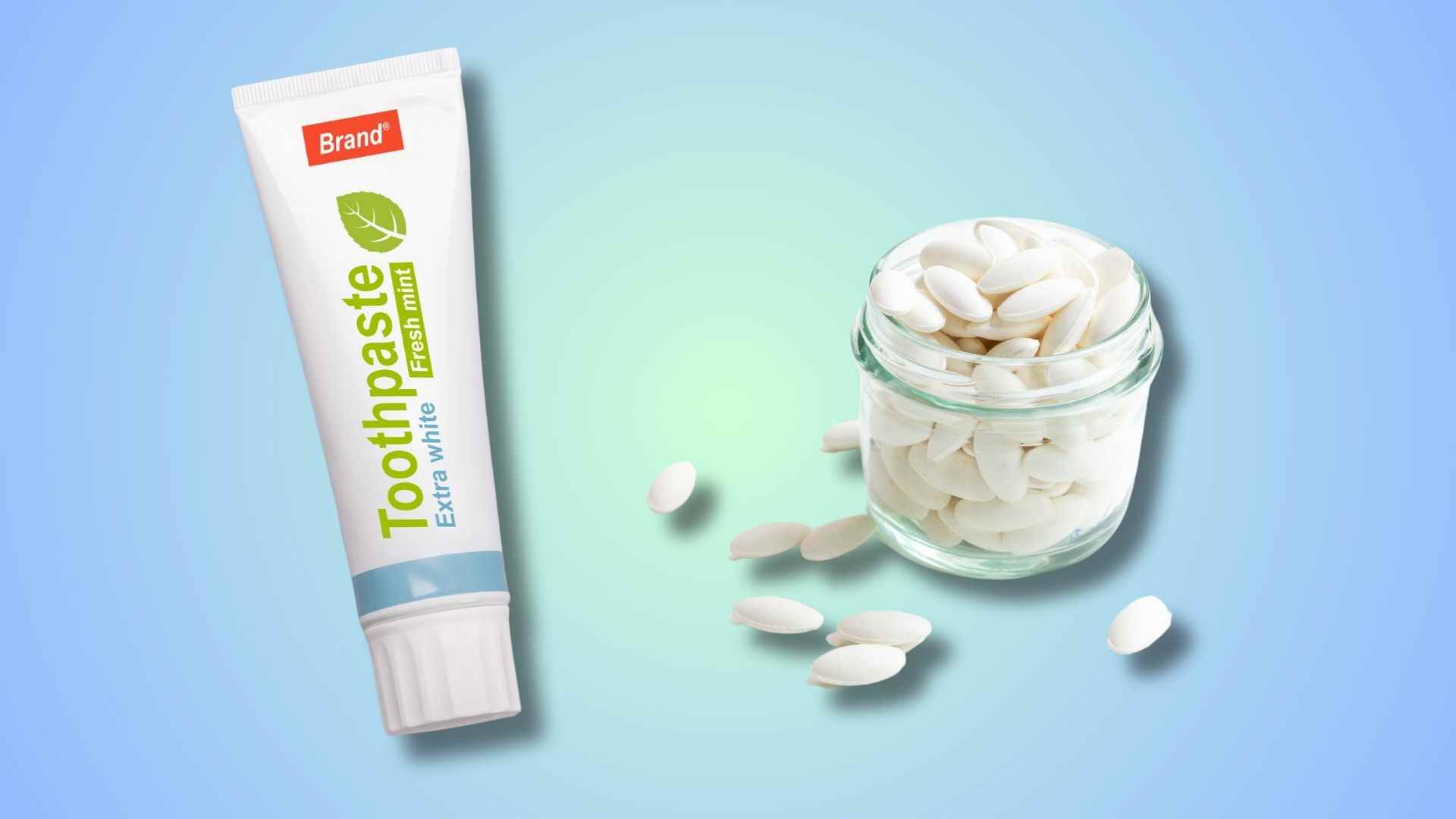Is Xylitol Safe in Toothpaste?
Yes, xylitol is safe in toothpaste. In fact, its safety and efficacy in dental care are well-documented.
You see, xylitol works differently from sugar; while sugar fuels the growth of harmful bacteria in our mouths, xylitol does the opposite. It actually can't be metabolized by these bacteria which leads to a reduction in their growth and activity.
This mechanism helps in lowering the risk of dental cavities and improving overall oral health. Further, xylitol's ability to neutralize acidity and maintain a neutral pH in the mouth supports the prevention of dental decay and cavities. That said, xylitol cannot reverse cavities.
Since xylitol can be beneficial for our oral health, you should include it in your overall daily oral care routine, including brushing with xylitol toothpaste, flossing with expandable floss, and tongue scraping.
In this article, I'll explain everything you need to know about xylitol safety and how to use xylitol toothpaste for the brightest, healthiest smile of your life.
So, what is xylitol toothpaste?

Xylitol toothpaste is a type of dental care product that incorporates xylitol as a key ingredient. Why xylitol?
Well, xylitol is a natural sugar alcohol known for its sweetening properties and oral health benefits. Unlike traditional sugars, xylitol doesn't contribute to cavities. Instead, xylitol in toothpaste actively combats the growth of cavity-causing bacteria in our mouths, particularly Streptococcus mutans.
This is the bacteria is responsible for producing the acidic by-products that lead to tooth decay. Xylitol works by inhibiting these bacteria, thereby reducing plaque formation and lowering your risk of dental cavities.
In addition to its antibacterial properties, xylitol also enhances saliva production, which is important for maintaining oral health. Increased saliva flow helps neutralize acids in our mouths, wash away food debris, and facilitates enamel remineralization, which can further protect against demineralization decay.
In addition to toothpaste, you can also find xylitol chewing gum and breath mints which can fight tooth decay.
Does xylitol toothpaste work?
Yes, xylitol toothpaste works effectively for several reasons related to our oral health. Xylitol, a natural sugar alcohol found in many fruits and vegetables, is used in toothpaste primarily for its ability to combat cavity-causing bacteria and promote saliva production.
You see, unlike regular sugar, xylitol doesn't feed the harmful bacteria in your mouth. Instead, it inhibits the growth of Streptococcus mutans, the key bacteria involved in tooth decay and plaque formation. By reducing harmful bacteria, xylitol helps decrease your risk of dental cavities.
Further, xylitol increases saliva production which plays a key role in neutralizing acids produced by bacteria, washing away food particles, and supporting remineralization. This natural process protects us against tooth decay and strengthens teeth.
Additionally, because xylitol is a sweetener, it makes toothpaste more palatable without the negative effects of sugar, enhancing the appeal of brushing.
Finally, studies have shown that regular use of xylitol-containing toothpaste can lead to a significant reduction in tooth decay and improvement in oral hygiene. Similarly, research shows xylitol gum can fight tooth decay and dental caries.
Xylitol Toothpaste Effectiveness
Xylitol toothpaste is effective in promoting oral health by reducing cavity-causing bacteria, such as Streptococcus mutans.
Studies have shown that regular use of xylitol can help decrease the incidence of cavities and improve overall dental hygiene.
For example, a study found that xylitol significantly reduced bacterial levels in the mouth, contributing to better oral health.
Plus, it helps neutralize plaque acidity and enhance remineralization.
Xylitol toothpaste is particularly beneficial for individuals prone to cavities or dry mouth, as it also helps stimulate saliva production.
Benefits of Xylitol Toothpaste

Xylitol offers many benefits for our oral health, making it a standout ingredient in toothpaste and other dental care products. Let's walk through 5 of the most important benefits together.
Prevents Cavities
One of the most celebrated benefits of xylitol is its ability to prevent cavities.
Xylitol works by inhibiting the growth of Streptococcus mutans, a cariogenic bacteria primarily responsible for tooth decay. Unlike regular sugars that feed harmful oral bacteria, xylitol can't be metabolized by these bacteria, thereby reducing their growth and the acids they produce that wear away at the enamel.
Research suggests that regularly using xylitol toothpaste can significantly lower your risk of developing dental cavities, offering a proactive approach to oral health.
Reduces Plaque
Plaque buildup is a major contributing factor to dental health issues, including cavities and gum disease. Thankfully, xylitol is good for your teeth as it is known for its ability to reduce the amount of plaque-forming bacteria in our mouths.
Since xylitol doesn't serve as a food source for these bacteria, their ability to stick to teeth and form plaque is diminished. This process helps keep your teeth cleaner and healthier, reducing the likelihood of oral health problems down the line.
Enhances Saliva Production
Saliva is a natural defense mechanism against tooth decay, and xylitol helps enhance its production. By stimulating saliva flow, xylitol helps neutralize acids in the mouth, washing away food particles, and keeping the mouth moist.
This increased saliva production is particularly beneficial for those of us suffering from dry mouth, a condition that can increase the risk of tooth decay and gum disease.
Remineralizes Teeth
Remineralizing teeth is one of the most important benefits of xylitol. Your saliva, stimulated by xylitol is rich in important minerals like calcium and phosphate which your body uses to remineralize, repair, and strengthen your enamel.
This process not only reverses tooth decay but also fortifies your teeth against future erosion.
Tastes Great
Beyond its health benefits, xylitol is naturally sweet and adding it to toothpaste makes it more enjoyable to brush with, especially for children and those who are sensitive to the taste of traditional toothpaste.
This pleasant taste encourages regular brushing and contributes to better oral hygiene without the negative effects of sugar.
Xylitol Side Effects

While xylitol toothpaste is widely regarded for its oral health benefits, there are a few potential side effects to be aware of. Let's walk through some of the potential consequences of xylitol, largely related to gastrointestinal effects and its impact on individuals with certain sensitivities.
Gastrointestinal Discomfort
Xylitol can cause gastrointestinal discomfort for some people, especially when swallowed in large quantities.
This is because xylitol is a sugar alcohol, which can be difficult for the body to digest if consumed in significant quantities. Symptoms may include bloating, gas, and diarrhea.
However, the amount of xylitol present in toothpaste is typically small, and since you don't ingest toothpaste, this side effect is more commonly associated with xylitol in food products rather than in dental care products.
Allergic Reactions
Although rare, some individuals may experience allergic reactions to xylitol. Symptoms could include itching, swelling, or irritation in the mouth or throat.
Anyone known to have allergies to sugar alcohols or specific sensitivities should proceed with caution and consul their dentist if they suspect an allergic reaction to xylitol toothpaste.
Toxicity in Pets
It's important to note that while xylitol is safe for human use, it is highly toxic to dogs and certain other pets. Even small amounts can cause hypoglycemia (low blood sugar), seizures, liver failure, or even death in dogs. Therefore, you should keep products containing xylitol, including toothpaste, out of reach of pets.
Does xylitol toothpaste prevent cavities?
Yes, xylitol in toothpaste can help prevent cavities.
Xylitol works by inhibiting the growth of Streptococcus mutans, the primary bacteria responsible for cavities and dental decay. Unlike regular sugar, which these bacteria metabolize to produce acid that erodes tooth enamel, xylitol does not provide a food source for them.
By reducing acid production, xylitol protects our enamel and can prevent demineralization, tooth decay, and eventual cavity formation. Additionally, xylitol has been shown to enhance the remineralization potential of fluoride only toothpaste which can further prevent cavities and strengthen tooth enamel.
Further, studies support the efficacy of xylitol in oral care. Regularly using xylitol-containing toothpaste contributes to a significant reduction in dental caries incidence and plaque formation.
Does xylitol toothpaste reverse cavities?

No, xylitol toothpaste does not reverse cavities. This is because you cannot remineralize a cavity once it has already formed.
That said, xylitol toothpaste can help in the early stages of cavity formation by promoting remineralization, a process where minerals are redeposited in demineralized tooth enamel. Xylitol increases saliva production, which is rich in minerals like calcium and phosphate that can strengthen tooth enamel and potentially reverse early enamel erosion.
This process can prevent smaller cavities from progressing past the initial stages of tooth decay. However, xylitol toothpaste cannot reverse cavities that have progressed beyond the initial stage of enamel demineralization to form a physical cavity.
Once a cavity has fully formed, you'll have to see a dentist for professional treatment to remove the decay and restore the tooth.
So, while xylitol toothpaste is great for supporting your overall oral health and reversing the early stages of tooth decay, it's not a substitute for professional treatment of established cavities.
Is xylitol better than fluoride toothpaste?

No, in terms of remineralization, xylitol toothpaste is not as effective as fluoride toothpaste.
The fluoride in toothpaste facilitates the remineralization process, where lost minerals are restored to enamel, making it more resistant to acid attacks from bacteria. This action not only helps repair early stages of tooth decay but also prevents new cavities from forming.
On the other hand, xylitol toothpaste offers a different approach for our oral health, focusing on reducing the levels of harmful bacteria in your mouth. By inhibiting the growth of bacteria like Streptococcus mutans, known for causing tooth decay, xylitol indirectly helps decrease the risk of cavities indirectly. It also promotes saliva production, aiding in neutralizing acids and providing some remineralization benefits.
So, while xylitol toothpaste can be beneficial for oral health, it doesn't directly strengthen the enamel like fluoride does. If you're considering the most effective way to prevent cavities and strengthen your teeth, fluoride toothpaste has the edge.
That said, because nano hydroxyapatite is just as effective as fluoride at remineralization, the best toothpaste to pick is nano hydroxyapatite toothpaste with xylitol.
Frequently Asked Questions
Is xylitol OK in toothpaste?
Yes, xylitol is considered safe and beneficial in toothpaste. Xylitol is a natural sugar alcohol found in many fruits and vegetables, and it's widely used as a sugar substitute. In dental care products like toothpaste, xylitol helps to prevent cavities by inhibiting the growth of bacteria that cause dental decay, particularly Streptococcus mutans. Additionally, xylitol boosts saliva production, which aids in the natural cleaning of teeth and neutralizes acids that can erode enamel. Therefore, using toothpaste containing xylitol can be a good choice for enhancing oral health.
Do dentists recommend xylitol?
Yes, many dentists do recommend xylitol as part of a dental hygiene regimen. Xylitol has been shown to help reduce the risk of tooth decay by inhibiting the growth of bacteria that cause cavities. It is often found in dental products such as toothpaste, mouthwash, and chewing gum, which are recommended by dentists for their oral health benefits. However, it's essential to use xylitol products as directed and in moderation to maximize their effectiveness and minimize any potential side effects.
Is xylitol good for brushing teeth?
Yes, xylitol can be beneficial for brushing teeth. Xylitol is commonly used in toothpaste because it has been shown to help reduce the risk of tooth decay by inhibiting the growth of bacteria that cause cavities. When used in toothpaste, xylitol can contribute to maintaining dental hygiene and preventing cavities. It's important to follow the manufacturer's guidelines and use xylitol toothpaste as part of a regular oral hygiene routine for optimal dental health benefits.
Which is better fluoride or xylitol?
Xylitol toothpaste and fluoride toothpaste serve different functions in oral health. Xylitol toothpaste targets harmful bacteria like Streptococcus mutans, reducing plaque formation and the risk of cavities by inhibiting bacterial adhesion and sugar metabolism. Fluoride toothpaste strengthens enamel, making teeth more resistant to acid attacks and aiding in remineralization, which repairs early tooth decay. While fluoride is widely recognized for cavity prevention, some individuals opt for fluoride-free alternatives like nano hydroxyapatite toothpaste due to personal health concerns. NOBS Toothpaste Tablets offer a solution by combining xylitol with nano hydroxyapatite, providing effective cavity prevention and remineralization in one convenient product.
What are the side effects of xylitol toothpaste?
Xylitol toothpaste is generally considered safe for most people when used as directed. However, some individuals may experience mild side effects such as gastrointestinal discomfort, including bloating, gas, or diarrhea, particularly if they consume large amounts of xylitol. Ultimately, it's essential to use xylitol products as directed and in moderation to maximize their effectiveness and minimize any potential side effects.
Does xylitol whiten teeth?
Xylitol itself doesn't directly whiten teeth but helps maintain oral health by reducing plaque and bacteria, which can contribute to a cleaner appearance. It increases saliva production, helping wash away food particles and acids that stain teeth. Regular use in oral care may support overall dental hygiene, but it's not a direct whitening agent.
Is toothpaste with xylitol safe?
Yes, toothpaste with xylitol is safe for daily use and beneficial for oral health. Studies indicate that xylitol reduces harmful bacteria in the mouth, helping prevent cavities and tooth decay. However, it should not be ingested in large amounts, as excessive consumption may cause digestive discomfort.
Is it safe to brush teeth with xylitol?
Yes, it is safe to brush your teeth with xylitol. Xylitol reduces cavity-causing bacteria, promotes oral health, and helps maintain a balanced oral pH. It is an effective and gentle ingredient in toothpaste suitable for regular use.
Can I chew xylitol gum everyday?
Yes, you can chew xylitol gum every day. It helps reduce harmful bacteria, stimulates saliva production, and supports oral health when used regularly. However, moderation is key, as excessive consumption might cause digestive discomfort in some people.
Is xylitol safer than fluoride?
Yes, xylitol is considered safer than fluoride, as it is a natural sugar alcohol and non-toxic. It doesn’t pose the same risks of overuse or toxicity that fluoride can present, especially in high amounts. Xylitol is a good option for those seeking a fluoride-free alternative.
Is xylitol good in toothpaste?
Yes, xylitol is beneficial in toothpaste. It helps reduce harmful bacteria in the mouth, fights cavities, and promotes oral health. Additionally, it is safe, natural, and gentle on the teeth.






















